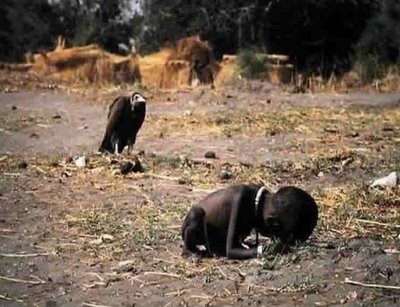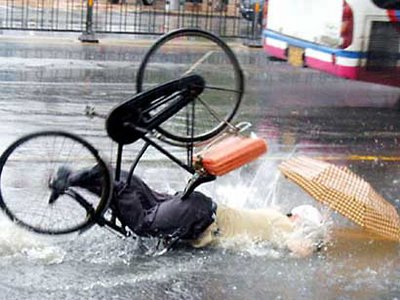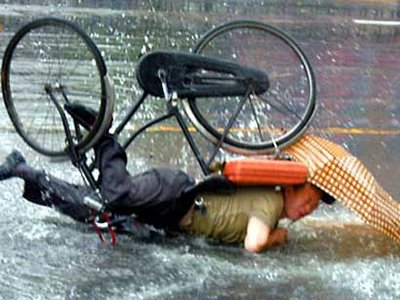Through the Lense
"A photographer has come under fire in China for his pictures of a man falling off a bicycle."

"The man came a spectacular cropper in Xiamen city after his bike hit a pot-hole submerged in rainwater.
But photographer Liu Tao was accused of lying in wait to take his pictures instead of warning people of the danger."
"Readers of the Beijing Youth Daily, which published the shots, wrote in to express their feelings.
One wrote: "The pictures are well shot, but the person who shot this is disgusting. He knew there was a pit, but was waiting there for someone to fall over."
And another said: "The photographer should really be condemned since he knew there definitely would be other victims."
Liu defended himself, saying: "I just knew that the city government has paved the pit, and without my pictures, the pit would not be noticed by the government, and there would perhaps be more people falling over."
Bugg's Take
Ok, so not much harm done right? The only thing bruised in that accident was probably the cyclist's pride, and maybe his 4th and 5th ribs, and perhaps some road rash on his face.But reading this bit of news brought to mind a decidedly more serious matter.
I had found out about the story of Pulitzer Prize winning photojournalist Kevin Carter a few years ago, and the Annanova article stirred this memory.
Kevin Carter (1960 - 1994)

This shocking photograph was bought by the New York Times and quickly splashed over newspapers worldwide. This image quickly became the image of Africa's anguish, struggling in the grip of famine and disease.
The reaction to the picture was so strong that The New York Times published an unusual editor's note on the fate of the girl. Mr Carter said she resumed her trek to the feeding centre. He chased away the vulture. Afterwards, he told an interviewer, he sat under a tree for a long time, "smoking cigarettes and crying". His father, Mr Jimmy Carter said: "Kevin always carried around the horror of the work he did."
Two months after receiving his Pulitzer, Carter would be dead of carbon-monoxide poisoning in Johannesburg, a suicide at 33. His red pickup truck was parked near a small river where he used to play as a child; a green garden hose attached to the vehicle's exhaust funneled the fumes inside. "I'm really, really sorry," he explained in a note left on the passenger seat beneath a knapsack. "The pain of life overrides the joy to the point that joy does not exist."
The very same happened to Carter. As photographers, they want to give a snapshot of a moment in time, be it joyous or horrific. But photographers are human too. What price, the images that we see on our TVs and newspapers and websites? Far too easily do we take them for granted.





0 Comments:
Post a Comment
<< Home